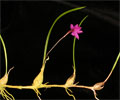|
|
|
|
 |
Email Address Recovery or Password Reset |
Use our Change Password page, and you can set a new password, or if you don't remember which email address you
registered with, the same page may be able to suggest it based on another you enter.
|
|
|
|
|
| |
Flasks of
Isabelia pulchella 'Whitten 3350' × self |
|
| |
|
|
| |
| Number: |
TN6462 |
| Name: |
Isabelia pulchella 'Whitten 3350' × self
|
| Type: |
self (What's that?) |
|
Click to Enlarge

Pod Parent Flower |
Click to Enlarge

Pod Parent Blooming Plant |
|
|
|
| |
For additional origin/habitat information supplied courtesy of
Charles and Margaret Baker, see further below, near the bottom of this page.
|
Temperatures we attempt to use in the lab & greenhouse:
| For Species: |
|
Spring, Summer, Autumn: days average 86°F, nights 66°F; best fit is Warm-Intermediate 87-64°F
(Source:
Baker's Web OSC) |
| For Species: |
|
Winter: days average 67°F, nights 50°F; best fit is Cool 70-52°F
(Source:
Baker's Web OSC) |
|
About the name...
| Etymology of |
Isabelia |
|
Named for Isabel, the Brazilian princess and regent, daughter of emperor Pedro II in the 19th century.
(Source:
Mayr & Schmucker 1998) |
| Etymology of |
pulchella |
|
From Latin "pulchellus" nice, beautiful, charming.
(Source:
Mayr & Schmucker 1998) |
| Pronunciation of |
Isabelia |
|
iz-a-BEL-ee-ah
(Source:
Hawkes 1978) |
| Pronunciation of |
pulchella |
|
pul-CHEL-ah
(Source:
Hawkes 1978) |
|
If you would like to direct someone to this web page, please copy and paste this URL into your email:
http://troymeyers.com/d?016462
| Flask Information |
| Availability: |
We have sold all of the flasks for this item. |
| You should: |
Consider getting individual plants or compots instead of a flask.
You can place a "Notify Flask Recipients" Request, and either we or a flask recipient may contact you when plants are available.
You may also place a "Notify Retries" Request, and if an identical pollination (the same parents) is done again, we'll let you know.
You may reserve a flask, but it's very unlikely you'll get one ...this could only happen if we found a flask that we didn't know we had. |
| Yield Estimate: |
115 plants (based on flask surveys done 02/24/2010 through 03/04/2010)
|
| Plantlet Sizes: |
From many flasks 30 - 60 mm plants (based on flask surveys done 04/26/2011 )
From one most recently surveyed flask 30 - 60 mm (04/26/2011)
|
|
You might also want to:
|
View the seed assay for this item.
View items of the same species.
View items of the same genus.
|
| Ordering Information |
| You are not currently logged in. |
|
You must be a registered user and be logged in to reserve a flask or place a notification request. Please log in:
|
|
 |
Email Address Recovery or Password Reset |
Use our Change Password page, and you can set a new password, or if you don't remember which email address you
registered with, the same page may be able to suggest it based on another you enter.
|
|
|
|
|
|
|
|
| |
The origin/habitat information below is supplied courtesy of Charles and Margaret Baker
The following information is based on the name of the plant provided by the donor, and assumes that the name is correct. If the plant has been misidentified, then the following information may not be correct.
This text is copyrighted by the Bakers and may not be reproduced without permission.
ORIGIN/HABITAT: Brazil. This miniature epiphytic species is found at
moderate elevations in the cool, damp mountain areas of the southeastern
states of Paraná, Santa Catarina, and Rio Grande do Sul, with some writers
reporting its occurrence in Rio de Janeiro and São Papule. Habitat
elevation has not been reported, so we have estimated it as being near sea
level because some growers have reported these plants require intermediate
to warm conditions. The data reveals that even near sea level, however,
winter minimum temperatures in the region are considerably cooler than the
values suggested by those growers.
More about this information and the Bakers...
|
|
|
| |
|
|
|